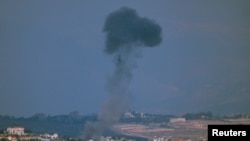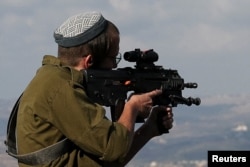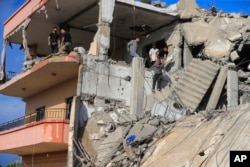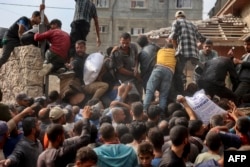The death toll in Lebanon surpassed 3,000 Monday in the 13-month-long conflict between Israel and Hezbollah, with the vast majority killed since hostilities dramatically escalated in mid-September and Israel invaded south Lebanon on October 1.
The Lebanese health ministry said more than 13,000 people have also been wounded. More than a million people have been displaced in the tiny country. Israel says the dead include hundreds of Hezbollah members. It also succeeded in assassinating the group’s top leader, Hassan Nasrallah, and several senior commanders.
In Israel, 72 people have been killed by Hezbollah rocket and drone attacks, including 30 soldiers, according to the prime minister’s office.

Meanwhile, Lebanon’s caretaker prime minister, Najib Mikati, called for “immediate international pressure” to end the war with Israel, protect civilians and medical teams from attack, as well as the country’s cultural heritage, the National News Agency reported Monday. Israel has conducted repeated airstrikes over the ancient cities of Tyre and Baalbek, risking damage to their ancient ruins.
Mikati also discussed the situation with the ambassadors of the five permanent members of the U.N Security Council — Britain, China, France, Russia and the United States — as well as the European Union.
In neighboring Syria, the state news agency reported an Israeli airstrike on a southern suburb of Damascus, saying it caused material damage but no casualties. The Israeli military said its air force struck Hezbollah targets belonging to the group’s intelligence headquarters in Syria.
In Gaza, Israeli airstrikes killed at least a dozen Palestinians on Monday in the northern town of Beit Lahiya, which has come under renewed intensive Israeli assault in the last month. Israel says Hamas militants are regrouping in northern Gaza, and they have issued evacuation orders for the remaining residents and have stepped up assaults on Jabaliya, Beit Hanoun and Beit Lahiya.
The area’s hospitals have also come under fire and only three are still partially functioning.

“Indonesian hospital is not functional anymore; Kamal Adwan and al Awda are minimally functional,” Rik Peeperkorn, World Health Organization representative in the West Bank and Gaza, told reporters in a video call from Gaza on Monday. He said if a planned WHO mission later this week is not allowed, al Awda would also “very quickly” go out of service.
The United Nations has repeatedly said it faces obstacles from Israel in delivering aid, especially in northern Gaza. Peeperkorn said there were very few missions to the north in October across U.N. agencies — they “got canceled, got impeded, got delayed.”
Currently, private imports are “virtually banned” and Israeli authorities are allowing the use of only three crossing points into Gaza — Kerem Shalom, Gate 96 (near central Gaza) and Erez West.
“Furthermore, humanitarian colleagues can only access these border areas by highly dangerous routes,” said U.N. spokesperson Stephane Dujarric. “The use of most roads leading to these entry points has either been banned by the Israeli authorities or rendered unsafe due to the ongoing hostilities.”

He said the routes available are often in poor condition and prone to looting by armed men.
The United Nations is also in the final phase of a massive polio vaccination campaign in Gaza, where the disease has been detected in wastewater. Peeperkorn said the goal is to vaccinate nearly 600,000 children under age 10 across the territory. Teams have reached more than 95% coverage in south and central Gaza, and in the first two days of vaccinations in northern Gaza they reached nearly 95,000 children, or about 79% of their target.
Israel cancels UNRWA
Israel’s foreign ministry said Monday that the country formally notified the United Nations that it will not cooperate with the U.N. agency for Palestinian refugees, UNRWA, once new Israeli legislation goes into effect early next year.
The move follows the Israeli parliament’s approval of legislation severing ties with the agency and banning it from operating in Israel.
“Despite the overwhelming evidence we submitted to the U.N. that substantiate Hamas’ infiltration of UNRWA, the U.N. did nothing to rectify the situation,” Israel’s U.N. Ambassador Danny Danon said in a statement.

Israel has long been critical of UNRWA and has accused some of its staff of taking part in the October 7, 2023, terror attack on Israel.
Israel has provided little evidence to support its claims, and UNRWA chief Philippe Lazzarini said last week that the agency has received no response to its repeated requests for Israel to provide such information. Where it has received evidence, it has acted.
UNRWA is the main distributor of aid to Palestinians in the Gaza Strip, where virtually the entire population needs humanitarian assistance.
Israel’s letter to the U.N. says the country “will continue to work with international partners, including other United Nations agencies, to ensure the facilitation of humanitarian aid to civilians in Gaza in a way that does not undermine Israel’s security.”
“If the law is fully implemented and the Israeli government makes it impossible for UNRWA to operate, this will have no effect on Israel’s responsibility to provide for the population,” U.N. spokesperson Dujarric said. He noted that UNRWA is continuing to operate in Gaza.
A group of about 50 countries led by Turkey has sent a letter to the president of the U.N. General Assembly calling for a halt in arms and munitions transfers to Israel where there are reasonable grounds to suspect they will be used against the Palestinians.
“We urge all necessary steps to be taken without delay to this end,” the letter says.
Israel’s envoy dismissed the move as “another ridiculous move by the Axis of Evil to act against Israel in the international arena.”
The letter is signed by, among others, Turkey, the Palestinian Authority, Brazil, China, Egypt, Iran, Jordan, Mexico, Nicaragua, Russia, and both the Arab League and the Organization of Islamic Cooperation.
More than a year ago, Hamas militants killed 1,200 people and captured about 250 hostages in their October 7 attack on Israel that sparked the current war. Israel says it believes Hamas is still holding 101 hostages, including 35 the military says are dead.
Israel’s counteroffensive in Gaza has killed more than 43,300 Palestinians, according to the territory’s Hamas-run health ministry, which does not distinguish between combatants and civilians in its count.
Hamas and Hezbollah have been designated terror groups by the United States and other Western countries.
VOA U.N. Correspondent Margaret Besheer contributed to this report. Some material came from The Associated Press, Reuters and Agence France-Presse.






